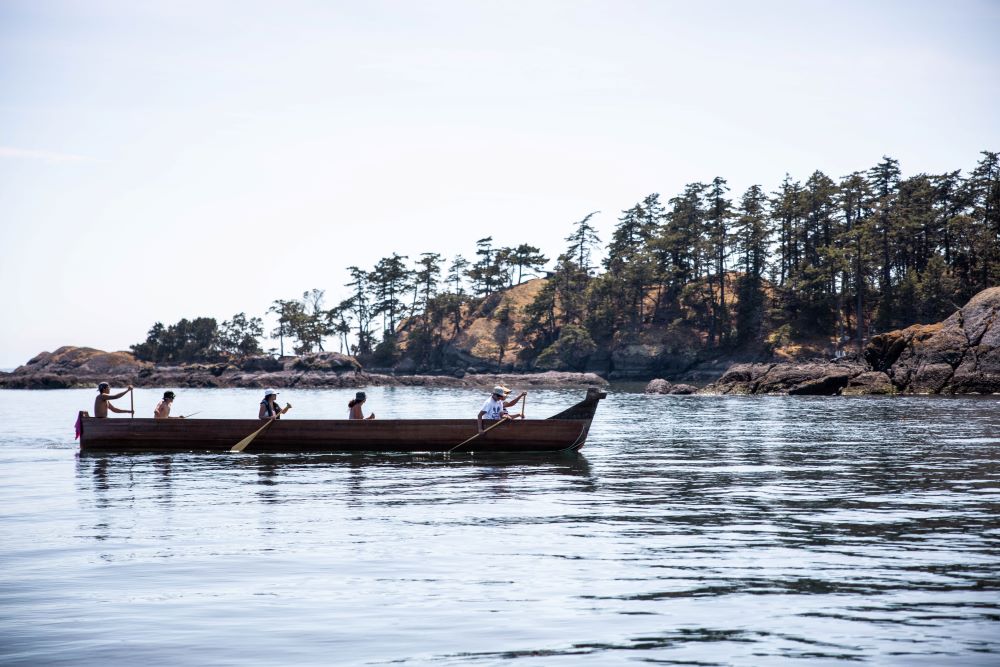
Reconciliation and REFBC: We Are Called to Action
On September 30, we at the Real Estate Foundation of BC (REFBC) will join people from coast to coast to coast in commemorating the National Day for Truth and Reconciliation and Orange Shirt Day.
It’s a day to reflect on the horrors of the residential school system, and of the harm Canada’s colonial systems have inflicted (and continue to inflict) on Indigenous peoples. For settlers, this means educating ourselves and our communities about Canada’s genocidal history, listening to and honouring survivors of residential and day schools, and demanding justice and restitution from our governments.

The establishment of the National Day for Truth and Reconciliation, first observed in 2021, came in response to the Truth and Reconciliation Commission of Canada’s 94 Calls to Action, specifically Call to Action 80.
As a philanthropic organization, REFBC has heeded the Calls to Action as a signatory to The Philanthropic Community’s Declaration of Action and by embarking on a journey of learning, supporting land-based projects led by First Nations and Indigenous organizations, and committing to uphold the United Nations Declaration on the Rights of Indigenous Peoples (UNDRIP).
Our commitment to this work has been at its best when done with the direction and insight of Indigenous leadership. Acting as better listeners has nourished relationships inside our organization and helped us achieve stronger social, environmental, and economic outcomes with partners. Acting on the TRC Calls to Action and UNDRIP commitments can be uncomfortable, but it is also joyful, helping us grow as individuals, organizations, and communities. We are grateful for the generous contributions of time and wisdom shared with us by Indigenous people, First Nations, and Indigenous-led organizations, and we will try to honour this through our policies, practices, and relationships.
In the past couple of years, some of the ways this learning has helped us include:
Shifting our priorities
Last December, REFBC’s Board of Governors approved our 2022-25 Strategic Plan, which will guide us in prioritizing Indigenous knowledge, experience, and ways of knowing in our grants, relationship-building, information- and story-sharing, governance, and operations. The plan identifies decolonizing as one of our core values.
Upholding Indigenous rights through watershed restoration
Advancing UNDRIP is a key objective of the Healthy Watersheds Initiative (HWI), funded by the Province of BC and led by REFBC in partnership with Watersheds BC. Out of the 61 watershed restoration projects funded by HWI, 90% supported the exercising of Indigenous rights and 80% incorporated traditional ecological knowledge. An eight-member Indigenous Leaders Advisory Circle helped steer the work of HWI and provided recommendations for BC’s Watershed Security Strategy and Fund. HWI also collaborated with Nahanee Creative to deliver decolonial workshops to hundreds of project participants.
Prioritizing funding for Indigenous-led projects
REFBC is committed to allocating a growing proportion of grants to First Nations and Indigenous-led organizations. Recently, REFBC awarded grants to the Aboriginal Coalition to End Homelessness Society, En’owkin Centre, First Nations Fisheries Council, Kanaka Bar Band, Ts’msyen Culture Society, Xeni Gwet’in First Nation Government, and many others. We are currently developing a new Indigenous-led grantmaking program under the direction of Indigenous leaders — stay tuned for details.
Establishing a fellowship to help advance UNDRIP in our work
Indigenous governance advisor Tara Marsden, who authored HWI’s UNDRIP evaluation report, has joined REFBC as a Fellow. The UNDRIP Fellowship aims to help uphold and protect the rights of Indigenous peoples through meaningful partnerships, land-based funding for First Nations, and enhanced organizational knowledge of the importance of UNDRIP in communities REFBC works with. REFBC will continue to draw on the expertise of international and national standards for funders advancing UNDRIP, including International Funders for Indigenous Peoples and The Circle on Philanthropy.
Helping educate the real estate sector about reconciliation
As a bridge between the worlds of philanthropy and real estate, REFBC hopes to raise awareness of Indigenous rights and title among real estate professionals. We’ve sponsored reconciliation workshops presented by the Real Estate Institute of BC. We were pleased to provide grant funding to help the South Okanagan Real Estate Board create a guide to climate resilience in the region that incorporates Syilx perspectives. On October 12, the BC Northern Real Estate Board and REFBC will present a webinar (featuring Marsden as a speaker) about HWI and its relevance to UNDRIP.
As a philanthropic organization focused on sustainable, equitable, and socially just land use, REFBC recognizes that First Nations have served as caretakers of these lands and waters for generations. First Nations need to have a leadership role in conversations and decisions about land and water.
It’s clear that supporting Indigenous-led, land-based work contributes to reconciliation and is critical to making progress on the TRC Calls for Action and UNDRIP. This work has benefits for all.
On the National Day for Truth and Reconciliation, and every day, we pledge to work to understand the history of colonization, and the past and ongoing harms, and to work in partnership with Indigenous peoples to cocreate a stronger, fairer future. We have much more listening, learning, and work to do.
National Day for Truth and Reconciliation 2022
Resources for Indigenous people
- National Indian Residential School Crisis Line: 1-866-925-4419.
- KUU-US Crisis Line Society: 1-800-588-8717.
- Tsow-Tun Le Lum Society: 1-888-403-3123.
Resources for settlers to learn, offer support, and act
- Refresh your understanding of the Truth and Reconciliation Report and Calls to Action.
- Give One Day’s Pay to support Indigenous projects, movements, organizations, and nations.
- Donate to the Indian Residential Schools Survivors Society or a local Indigenous organization offering support services.
- Attend an in-person or virtual event commemorating the National Day for Truth and Reconciliation, such as the Yellowhead Institute’s A Calls To Action Conversation on Truth & Reconciliation on September 29.
- Read a book by an Indigenous author to educate yourself about the experiences of survivors and their families.
- Commit to learning and action on decolonizing policies and practices.
SHARE